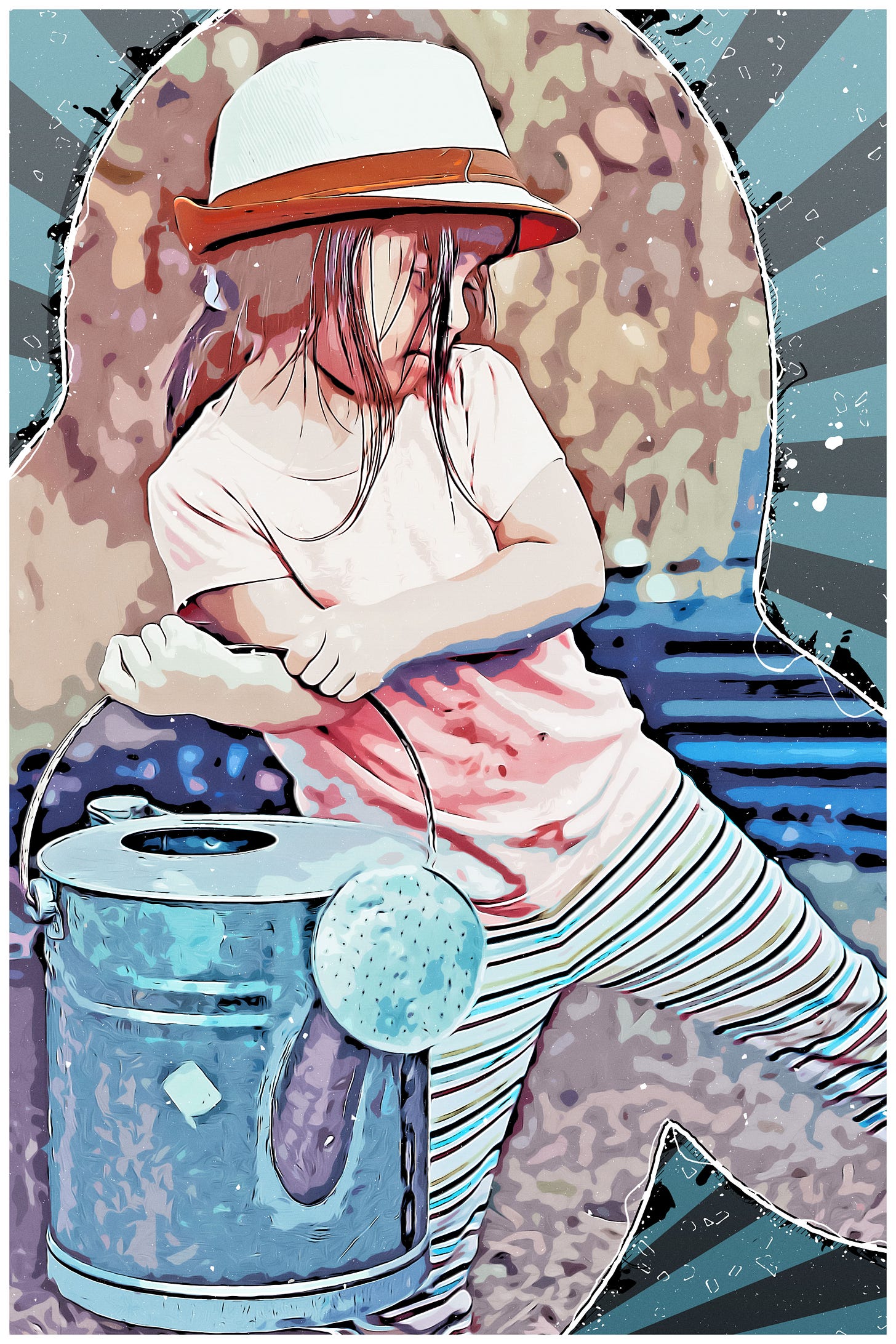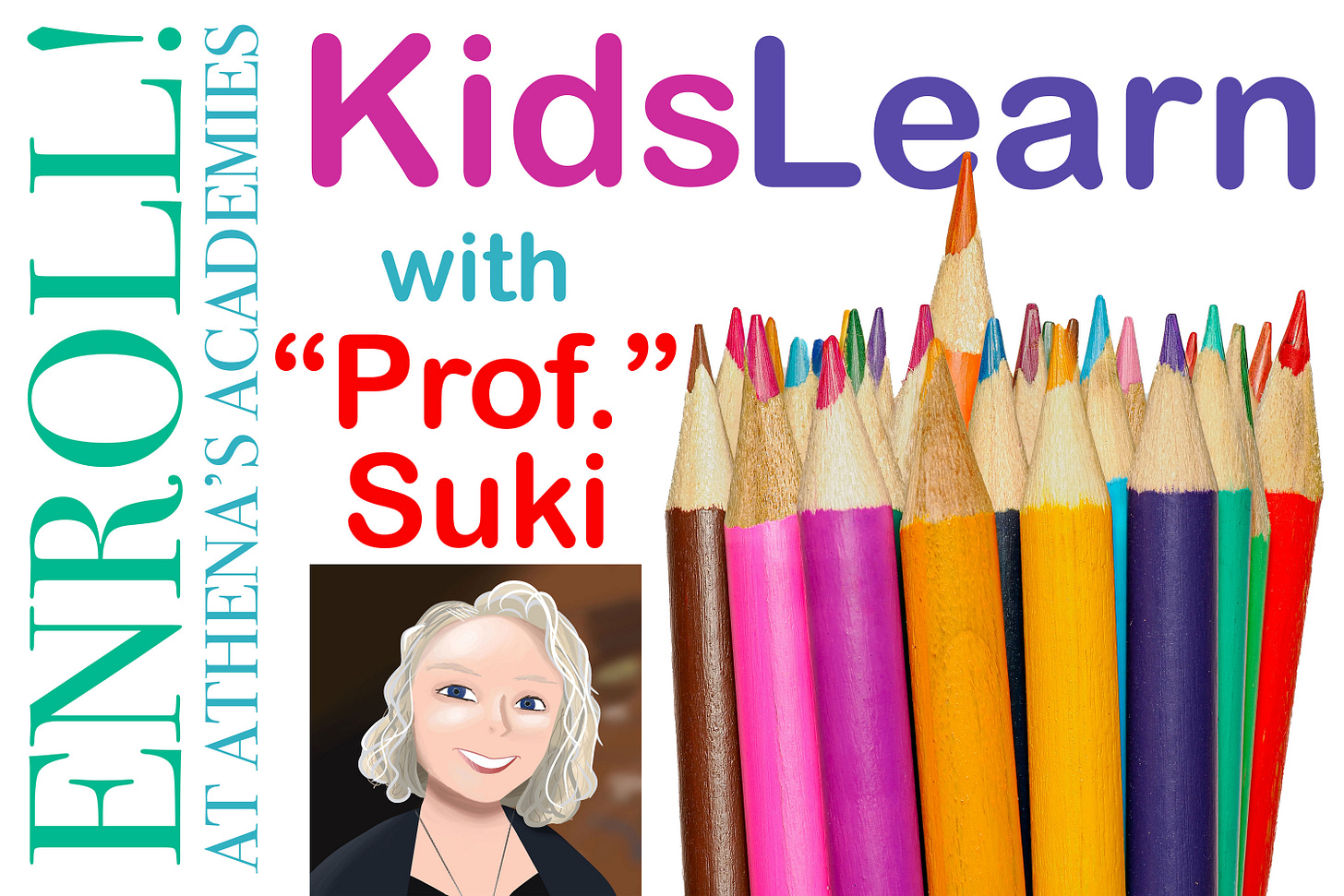We’ve all seen it: A 2-year-old insisting that they can haul the big watering can around the garden. Demanding to be allowed to make pancakes on their own. Drawing a picture of their parent and insisting it looks just like them. We could all learn from a 2-year-old’s moxie.
The KidsLearn Substack is written by Suki Wessling, known as “Prof.” Suki to her students. Scroll to the bottom for links to Suki’s work and more information. If you enjoy my work, please interact with this post. A “like” or comment goes a long way and will make my day!
Modern life is hard on agency
Writers of kidlit talk a lot about “agency”: Our young readers like kid characters who are in control of their destiny, who are active rather than passive, who don’t depend on adults to do everything for them. In the age of cellphones and the Internet, however, agency is not an easy currency to come by.
Kids these days are almost always connected to the adults in their lives through digital devices. They seldom experience the joy (and occasional terror) of finding a way to solve their problem alone.
Kids these days have immediate access to any information they need. They seldom experience the thrill of the hunt for answers in the stacks of a library or the fun of stumbling upon a person who has the knowledge they seek.
Kids these days have the tools to create almost anything they need or desire. They don’t have to depend on themselves to draw a fairy—they can just ask AI to do it. They don’t have to design their own t-shirt or make up their own recipe—the Internet gives them access to “professionally designed” shirts and “the best” recipes created by an adult.
Join the Fairy Cottage drawing challenge! I am working on publishing my next book, How to Make Magic Real, and I’m looking for some kid art for the book and the website. In my story, 11-year-old Ada draws a picture of the Victorian cottage next door, which she calls The Fairy Cottage. I’d love to get some real children’s drawings of the cottage. Contact me for details!
We have to intentionally build agency into modern kids’ lives
During summertimes in the 60s and 70s, we kids never dared to tell our moms we were bored. A typical mom would offer two options: help her with a task she was doing, or get out of the house. It’s not like there weren’t dangers out there, but parents figured that childhood was all about learning how to navigate those dangers. As a child, I did lots of things I really shouldn’t have, such as balancing on a pipe across a swiftly running creek. But those activities, done with other children or alone, helped build my sense of agency.
How can we help children build a sense of agency now? All too often, we read about parents who are punished for what parents used to do without thinking, such as letting their kids walk to a park. We’re spooked by Amber Alert signs hanging over the highway. Our neighbors don’t let their kids out, so our kids are outside alone. Even if we don’t schedule every minute of our own children’s lives, the parents around us do and our children are left without friends if we don’t join them.
I’d love to tell you that I have a magic incantation to fix this, but I don’t. I can, however, make a few suggestions of concepts to keep in mind as your children grow:
Encourage “I do it mySELF!”
From the moment your child wants to do things, let them. I realize that this means that the flowers will be planted haphazardly, your kitchen will be a mess, and you’re never going to be able to find a good pair of scissors, but that’s a small price to pay for a lifelong gift you give your child. Resist the urge to fix things for your children or make everything perfectly safe. When they present you with a problem, ask them how they are going to fix it. If they ask for your help, ask them what they need. Don’t do it for them.

Resist buying simplicity
I literally witnessed the creation of Amazon.com, and I can assure you that no one knew how deeply online shopping would change our culture. The urge to use “one click” to solve a problem is strong, and must be resisted. For yourself, it’s no shame to buy what you need if you don’t have time to make or find it. But for kids, focus on modeling self-reliance. Sure, they could order new clothing for their dolls, but a rag bag, needle, and thread builds confidence and is much more fun. Sure, they could buy fun accessories for their bike, but what could they make with their imagination and some basic supplies?
Appreciate imperfection
In a time when a computer can create adult-level art, write a story with a perfectly arced plot, or design a website, it’s so tempting to let kids depend on these tools. There’s a great argument for kids learning to use digital tools because they’ll need the skill later, but that doesn’t mean we should let tools rob kids of their agency. Especially when children are young, we need to appreciate their imperfect attempts and encourage the hard work behind what they create. As I tell my creative writing students, “I appreciate everything your wonderfully weird human brain spits out so much more than what a bland, crowd-sourced AI dishes up.”
Ask for these qualities from your child’s educators
If you have a choice of schools, choose the one with teachers who encourage agency in their classrooms. When you choose a summer camp or art class, find the one where the activities allow agency. Ask educators how they view this issue, and whether they intentionally build agency into the classroom. If you can, provide support for teachers to take on more complex and open-ended activities in the classroom. If you’re a homeschooler, resist the temptation to help unless you’re asked.
Nurture a community
Finally, what saved my life as a parent was finding like-minded parents to support me. In my case, I suddenly became The World’s Most Reluctant Homeschooler so I found those friends in the homeschool community. Your situation will be different. But all it takes is one other parent to make a support group. Take the time to talk about what you want your children’s childhood to look like, how you can build agency into their lives, and how you can support each other.
And then keep at it. Parenting is a process of confronting your own imperfection over and over, day after day. Successful parenting requires keeping your eye on the horizon, picturing the young adult you hope to see walk out your door someday. Who will they be? You can’t know, but you can know that you did everything you could to equip them to walk out that door with agency.
How do you give your children or students agency?









